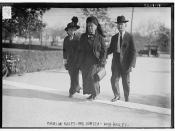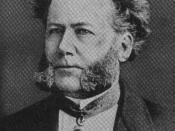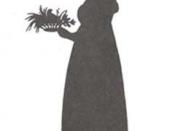Reflections of 19th Century Stereotypes Many authors describe their society through their literary works. Henrik Ibsen is a perfect example of this as he explains: "My task has been the description of humanity"�(Fjeble 120). Ibsen lived between 1829 and 1906 and therefore experienced the prime of the 19th century. 19th century America was filled with hard-working people, a structured family life and clear-cut male/female roles. Ibsen is known to reflect the 19th century society through most of his work, including A Doll's House. The male/female roles of the repressed 19th century society are clearly reflected through the characters of Torvald and Nora in Ibsen's A Doll's House.
The 19th century American perceived the "ideal"� family has having the stereotypical authoritative father and home-bound mother. As the 19th century progressed, man and woman grew farther apart. "The traditional separation between the male public sphere and the female private sphere took on new meaning in the 19th century as the distance between these worlds grew [...]"�(Freedman
118). The men were taking a more public role and the women taking a more private role. Due to the man's public role, the people of this century were obsessed with outer appearance and therefore "the popular model for happy marriages in the mid-19th century immensely fortified the home as enclosure, cradle and prison"�(Bradbrook 297). The woman was confined to her home and therefore took on a more private role in this century. Hence the differences in the roles of the male/female caused a withdrawn relationship between man and his wife.
Turk 2 The stereotypical male of the 19th century was only interested in controlling every aspect of his life. The 19th century man was considered "[...]strong but crude[...]"�(Bailey 339). The males of this period presented themselves as being assertive, as Blum states, "Men are...


